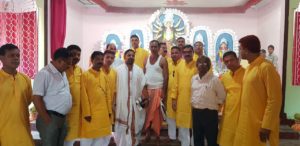Barak UpdatesBreaking News
Durga Puja begins with bright sunny weather on Maha Saptami

October 16: After incessant rains for days together as an aftermath of monster storm ‘Titli’, bright sunny weather paved way getting rid of overcast sky. The bright sunrays on Tuesday morning, the day of Maha Saptami brought smile in the face of the devotees and people at large. The weather was also a sign of relief for the organizers of Durga Puja who have decorated their pandals with utmost care for the spectators to visit and admire the display of artistic skills.
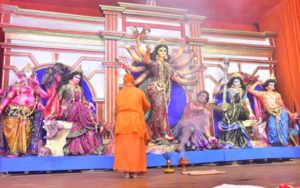
Goddess Durga, also identified as Shakti, Bhavani and Adi Parashakti, is always depicted as a fearless Goddess whose mythology revolves around winning of good over evil. The theists are glad for they believe that it is the result of unbounded blessings of Devi Durga that sunlight has paved its way biding adieu to rains.
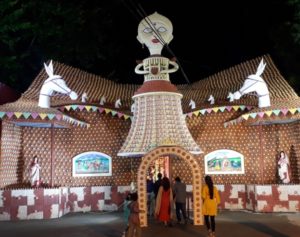
Durga Puja, also referred to as Durgotsava or Sharadotsav is an annual Hindu festival, especially of the Bengalis who celebrates worship of the Hindu goddess Durga. It refers to all the six days observed as Mahalaya, Shashthi, Maha Saptami, Maha Ashtami, Maha Nabami and Vijayadashami. Durga Puja festival is celebrated from the sixth to tenth day of bright lunar fortnight in the Hindu calendar month of Ashvin. This period falls in the fortnight corresponding to the festival is called Devi Paksha. Devi Paksha is preceded by Mahalaya, the last day of the previous fortnight Pitri Paksha, and ends on Kojagori Lokkhi Puja.
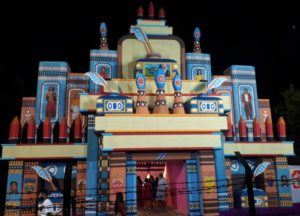
On the early hours of Saptami, Goddess Durga is invoked in a group of nine plants bunched together, called Navapatrika, and tied to the twigs of white Aparajita plant with a yellow thread. These nine plants represent the nine manifestations of Goddess. The Navapatrika is given a pre-dawn bath in the Ganga water along with the chanting of hymns.
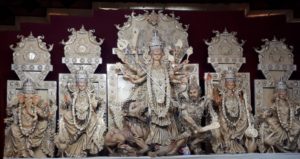
The nine planets of Nabapatrika represent nine Goddesses: Banana plant: Goddess Brahmani, Colocasia plant: Goddess Kalika, Turmeric plant: Goddess Durga, Jayanti plant: Goddess Kartiki, Bel leaves: Lord Shiva, Pomegranate leaves: Goddess Raktadantika, Asoka leaves: Goddess Shokarahita, Arum plant: Goddess Chamunda and Rice paddy: Goddess Lakshmi.
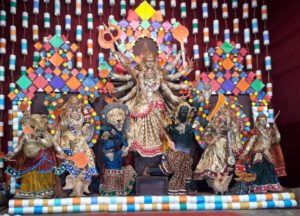
The ritual of Navapatrika is followed by ‘Maha Snan’ (The Grand Bathing). This is one of the most important rituals. A mirror is placed in front of Goddess Durga’s idol. The reflection in the mirror is given a bath and is known as Maha Snan.

After the Maha Snan gets over, the priest amid chanting of hymns does the ‘Pranpratistha.’ The aim of Pranpratistha is to awaken the spirit of Goddess Durga. A pitcher full with water is placed in front of the idol. A bunch of five mango leaves is placed on the top of the pitcher and a coconut is placed over it. It is believed that ‘Mahisasur Mardini’ Durga starts her battle against demon Mahisasur and finally wins back the peace and tranquility of heaven after slaying the buffalo demon ‘Mahisasur.’
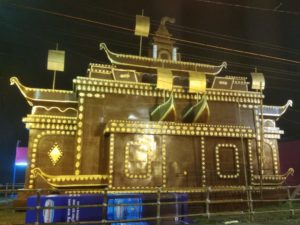
At Silchar, devotees thronged the puja pandals in the morning of Maha Shasthi to offer ‘Puspanjali’ to Goddess Dura wearing new clothes. Children were seen to be in a jovial mood enjoying along with their parents wearing festive garments.
